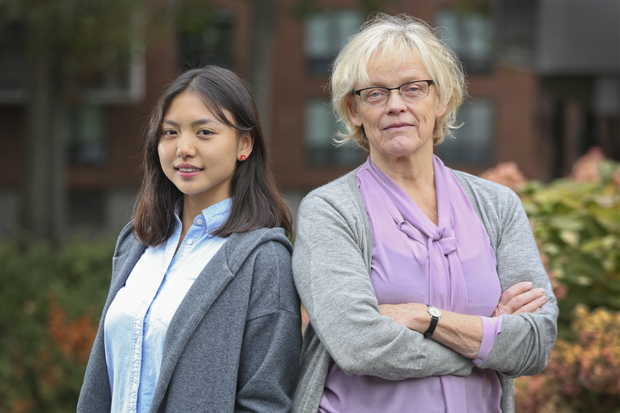Preventing acts of terror, before Jihadists plan them
 Photo/Mike Lovett
Photo/Mike LovettYujiao "Sue" Su '19 (left) and politics professor Jytte Klausen
Can research on radicalization eventually prevent terror attacks from happening?
Yujiao “Sue” Su ’19 is working to answer that question as part of a team of paid student researchers with Brandeis’ Western Jihadism Project.
Launched by politics professor Jytte Klausen in 2006, the Western Jihadism Project is housed inside a Brandeis computer laboratory and supports research on Al-Qaeda-affiliated terror networks in Europe, North America and Australia.
Su, an undergraduate research analyst from Sichuan, China, works with her peers to catalogue information on thousands on terrorists and organize it into a custom-built database.
“You know that these terrorist acts are happening all over the world and now you get to study this phenomenon,” said Su, who is also a Gateway Scholar. “The subject is sensitive because most people don’t have a substantive understanding of it, but when our team looks at terrorism we’re not merely looking at ideology. We want to know how this terrorist network is formed.”
The Western Jihadism Project’s student staff includes a mix academic backgrounds – from psychology and politics majors to those studying international relations, near eastern and Judaic studies and computer science.
Klausen appreciates having diverse perspectives on her team, not only for examining data but also to enhance teamwork and the Western Jihadism Project’s overall bandwidth. For instance, a team of computer science students created a server and custom-built web portal so other institutions can access the project’s research through an encrypted wormhole.
Written in two computer languages, the server has been upgraded three times and now includes records on 6,300 individuals, 848 terror plots and 333 terrorist organizations.
Su, who majors in politics and minors in business, enjoys being part of the venture. She took Klausen’s course “War on Global Terrorism” during her sophomore year based on the professor’s reputation as a dynamic teacher and came to be fascinated by the subject matter.
At Klausen’s suggestion, she joined the Western Jihadism Project, where she now helps lead her peers and adds new findings to the project’s servers via her senior research thesis, which examines the role prison can play in radicalization.
“Prison is a very interesting place, particularly in the United Kingdom and France,” Su explained. “Sometimes we see petty criminals introduced to terrorists in these settings. Some of these petty criminals are transformed and when they’re released, they commit terrorist attacks. I’m studying what prompts this transformation.”
The Western Jihadism Project has employed 80 undergraduate and graduate students from 14 different academic departments since its inception. Last summer, Su and Emily Smith ’19 received grants from Provost Lisa Lynch to conduct independent research related to the project. Smith even visited the Centre d’analyse de terrorisme (Center for the Analysis of Terrorism) in Paris to present her work.
The project has garnered national attention, too. Earlier this year, the U.S. Department of Justice awarded Klausen and researchers at the Colorado State University a $731,000 grant to use the Western Jihadism Project’s data collection to create an algorithm that can predict when an individual will become radicalized.
Klausen is optimistic about the project and credits her students, both past and present, for doing so much of the legwork over the last 12 years. That said, she’s also remained passionate about teaching her current crop of researchers.
Su, who plans to pursue law school next year and focus on either intellectual property or cyber law, considers herself fortunate to have found a mentor that has helped show her the value of research.
“In this case, the subjects of law and terrorism are not closely related, but the way of thinking – to analyze something or follow a line of logic – that helps me prepare for law,” Su said. “You’re using a basic guideline as a lens to examine certain phenomenon.”
Klausen also appreciates having Su on her research team.
“Su has such a sunny, bright personality and it’s such a joy to have her here in our lab,” Klausen said. “Her wonderful disposition is matched by the quality and precision in the way she conducts research and helps others.”
Categories: General, International Affairs, Research, Student Life





